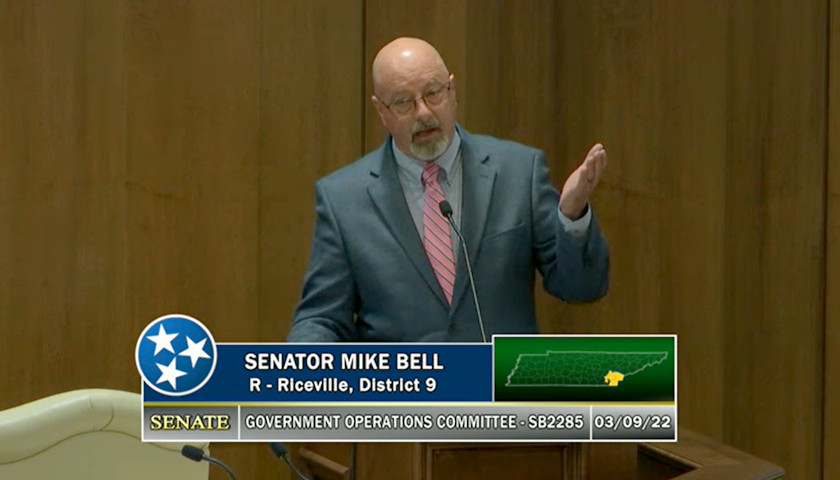Legislation being considered by the Tennessee General Assembly would eliminate the current practice of state courts giving deference to state agencies in interpreting statutes or rules in a contested case. If passed, the law would require that state courts interpret the state or rule de novo or from the beginning or start.
State Senator Mike Bell (R-Riceville) presented the bill, SB2285, Wednesday to the Senate Government Operations Committee, of which he is a member. While committee members often present their bills from their usual chair, Bell told Chairman Kerry Roberts (R-Springfield) he would be going to the podium, expecting he might be using his hands a bit.
Bell introduced his bill by discussing a 1984 landmark U.S. Supreme Court case Chevron v. Natural Resources Defense Council.
According to the U.S. Department of Justice, “Chevron is one of the most influential administrative law cases decided by the Supreme Court in the past half-century. It provides principles to determine the extent to which a court reviewing agency action should give deference to the agency’s construction of a statute that the agency has been delegated to administer.”
Bell described the impact of the Chevron decision to the committee members in slightly different terms.
“There has been nothing,” Bell emphasized, “nothing that’s happened in our country since 1984 that has caused the administrative state to grow in power and in authority more than the Chevron case.”
In that case, the court said that deference should be given to the administrative state when it comes to the interpretation of their own rules, Bell expounded, resulting in the term Chevron deference.
Bell read the language of the amendment that makes the bill, which would be added as a new section in Tennessee code:
In interpreting a state statute or rule, a court presiding over the appeal of a judgment in a contested case shall not defer to a state agency’s interpretation of the statute or rule and shall interpret the statute or rule de novo. After applying all customary tools of interpretation, the court shall resolve all remaining ambiguity against the state agency.
During his reading of the short bill, Bell told committee members that de novo means from the beginning, start or to start equally. Additionally, “against the state agency,” means that when there is ambiguity, the court’s decision would have to be in favor of the citizen, business or corporation.
Bell went on to give a visual description of Lady Justice, blindfolded with the equal scales before her.
What the Chevron case did, according to Bell, is to tell the courts to take the blindfold off, look at the administrative state and tip the scales in favor of the administrative state – before the court even starts to interpret the rule or statute – and then make the decision about who should win the case.
“It’s completely changed the way the courts should operate and have since 1984, again, in favor of the state, in favor of the administrative law or regulation and against the corporation, business or citizen,” Bell emphasized.
Bell went on to say that the Chevron ruling has impacted individuals as well, referring to the case of Buffington v. McDonough, in which an Air Force veteran is trying to get his benefits from the Veterans’ Administration. Due to Chevron, Buffington has lost two previous hearings and is currently under appeal.
Bell introduced a guest from Washington, D.C., Daniel Dew, who serves as the legal policy director at Pacific Legal Foundation a near 50-year nonprofit public interest law firm.
Dew explained that the foundation originated in California out of staff of then-Governor Ronald Reagan to protect individual liberty and constitutional rights. As such, one of the foundation’s main priorities is protecting separation of powers, ensuring each branch of government is performing is proper functions.
Undoing Chevron deference, Dew said, is a major component of that effort, making sure that the court is fulfilling its proper duty to interpret the law and not “punting” that duty to an administrative agency.
Dew contrasted administrative law to criminal law where there is the rule of lenity, the court ruling in favor of the accused, because people should not be put in prison or lose their life and liberty because there is ambiguity in the statute that a reasonable person would not know what was prohibited or required by the government.
Likewise, contracts, Dew explained, are always interpreted against the drafter, to incentivize them to write in a clear and precise manner.
The federal court and many state courts, including Tennessee, have adopted the Chevron deference, Dew said before reading from a Tennessee supreme court case:
Courts generally give great deference to an agency’s interpretation of its own rules, because the agency possesses special knowledge, expertise and experience with regard to the subject matter of the rule. Thus, an agency’s interpretation of its own rules has controlling weight, unless it is plainly erroneous or inconsistent with the regulation.
In addition, Dew said that the court’s position does not do a good job of giving people reading the regulations and making decisions fair notice of what is legal or illegal. Beyond that, Dew added, it even allows the opportunity for government to claim one interpretation of a regulation in one case and a different interpretation of the same regulation in a different case. The government wins each time, Dew said, because the courts defer to the government’s interpretation.
Dew said that some state courts have overturned Chevron and, in other states, including Wisconsin, Arizona, Florida and Georgia, the legislatures have told courts to review de novo. Prior to the bill under discussion, in Tennessee the legislature has instructed courts in the code to look at cases de novo over 60 times, according to Dew.
Democrat State Senator Heidi Campbell (D-Nashville), in addition to other questions, engaged in somewhat of a running discussion with Dew, apparently not understanding that it is not permissive or at the court’s discretion to defer to the agency’s interpretation of a rule or statute.
Meanwhile, Republican State Senators Janice Bowling (R-Tullahoma) and Paul Rose (R-Tipton and part of Shelby County) as well as Roberts were very complimentary of Bell’s bill.
Bowling thanked Bell for an outstanding piece of legislation, which she said was probably one of the best of the legislative session. With his permission, Bowling said she would like to sign on to the bill.
Rose said he wanted to go on the record to appreciate Bell for bringing the bill and his witness. Alluding to a question by Campbell to Dew, Rose added that he didn’t have the records as to how many times the courts have shown deference to agencies, but if they did it even one time it was too many.
Roberts said it was an “awesome bill,” and thanked Bell for bringing it.
The roll call vote of 7 to 2 in favor of the bill was along party lines. Voting in favor were State Senators Rusty Crowe (R-Johnson City), Ed Jackson (R-Jackson), Mark Pody (R-Lebanon) in addition to Bell, Bowling, Roberts and Rose. Voting against the bill were State Senators Sara Kyle (D-Memphis) and Campbell.
The legislation advanced to the March 15 calendar of the Senate Judiciary Committee, which Bell chairs.
The companion HB1749, sponsored by State Representative John Ragan (R-Oak Ridge) has passed out of its first stop at the House Departments & Agencies Subcommittee and is on the calendar of the full House State Government for March 15.
– – –
Laura Baigert is a senior reporter at The Star News Network, where she covers stories for The Tennessee Star and The Georgia Star News.








